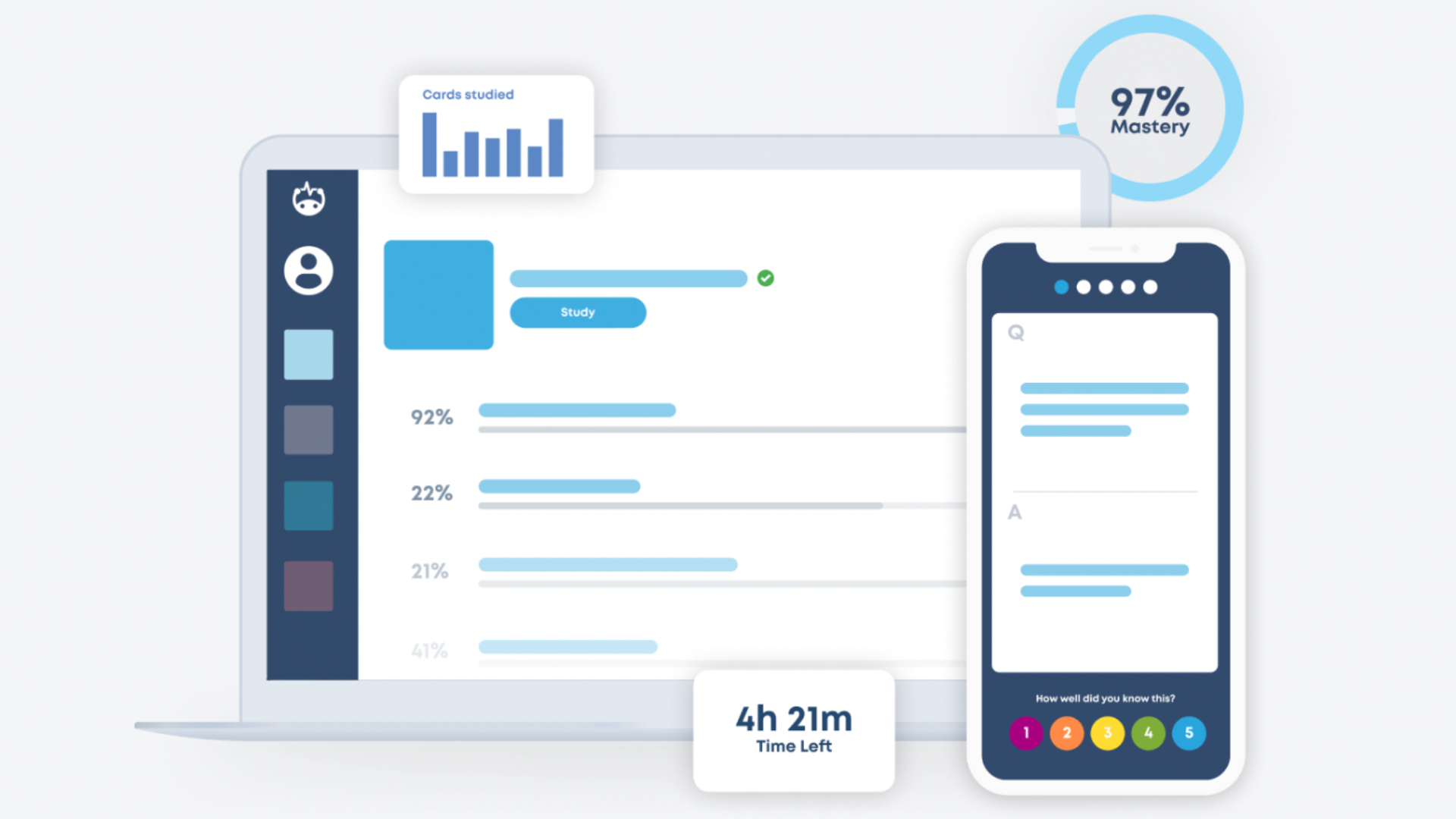As a human living in the third decade of the 21st Century, you are the beneficiary of generations of technological developments, cognitive science research, and AI innovation. This equips you with teacher tools of unprecedented power, perhaps chief of which are AI-powered flashcards.
You’ve probably heard about digital flashcards, right? (You may have even used ETS’s digital flashcards to study for and pass your Praxis exam.)
Well, AI-powered flashcards are simply digital flashcards that have been created by the AI that’s baked into study apps like Brainscape, Knowt, and Quizlet.
This allows educators to easily create detailed, quality study assets for their class in seconds, eliminating the pain of lesson prep, and freeing up teacher time to focus on higher-level tasks.
Most importantly, however, AI-powered flashcards equip students with a study tool that leverages the very cognitive science of learning, not only boosting their scores but also teaching them how to learn effectively, a skill they’ll take with them into college, their careers, and the rest of their lives!
Convinced?
Let’s explore how this is all possible with AI-powered flashcards.
Which Flashcard Study App Should You Choose?
The first step is to choose an AI-powered flashcard platform. While there are a ton of them out there—many of which do a decent job—you should ideally choose one whose study algorithm is based on how humans are cognitively wired to learn. That means leveraging the learning power of:
- Active recall: Remembering a concept “from scratch” without recognizing it on a list of possible answers. I.e. no multiple-choice questions.
- Metacognition: Reflecting on how well you knew the answer and then rating your confidence on a scale, e.g. from 1-5.
- Spaced repetition: Repeatedly studying concepts at a frequency that is based upon how well you know each one, with more time spent on your weaknesses.
Flashcards, which break down content into question-and-answer pairs, with the answer hidden on the reverse side of the card, naturally excel at eliciting active recall. But only some flashcard apps then prompt the learner to rate their confidence on a varied enough scale to really exercise metacognition, which deepens memory. Finally, spaced repetition is the real “secret sauce” that fosters fast, efficient learning.
One particular tool that incorporates all of these cognitive science principles—and also packs an AI flashcard generator—is Brainscape, but there are others. (As the founder of Brainscape and the author of this article, I may be a little subjective. But only a little 😉.)
How to Use AI-Driven Flashcard Generators to Instantly Create Study Assets for Your Class
Take a look at the following screenshot, which shows a flashcard creation prompt from the study app Brainscape:
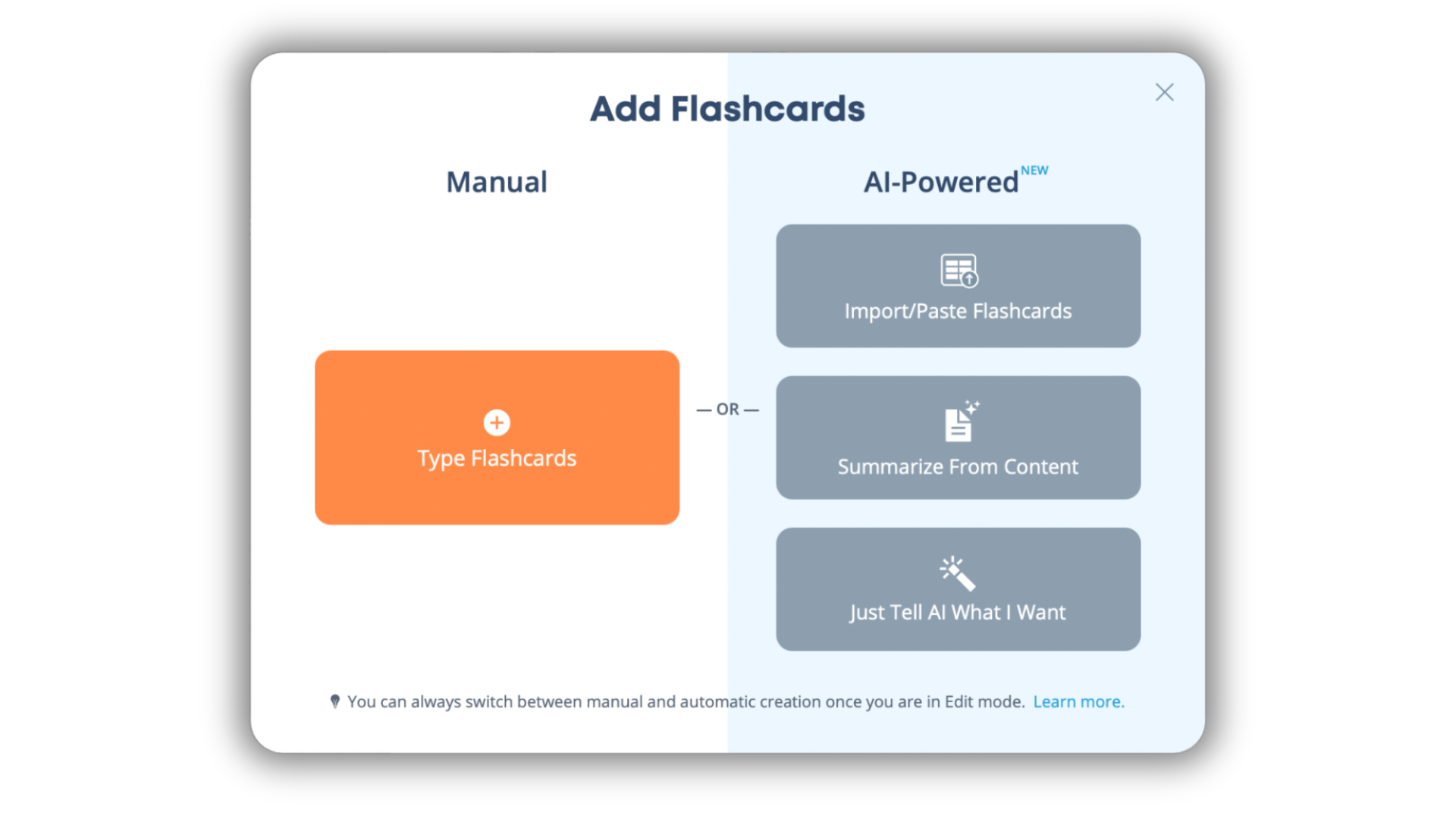
On the right, you’ll notice a suite of AI-powered tools that allow educators to import and transform lists of data into flashcards; to summarize swaths of written text into flashcards; or even to just tell the AI what they want and have it draw upon its vast knowledge base to create flashcards.
Once you’ve made your choice, the AI will scan the content and instantly create a set of flashcards based on the most important concepts, definitions, questions, and facts.
Let’s take a look at an example.
On the left is a photo I took using my iPhone of a book on aquaponics, which I then uploaded to Brainscape’s AI flashcard generator. After maybe 8 seconds of processing, the AI wrote six high-quality flashcards (right) based on the content contained in this page.
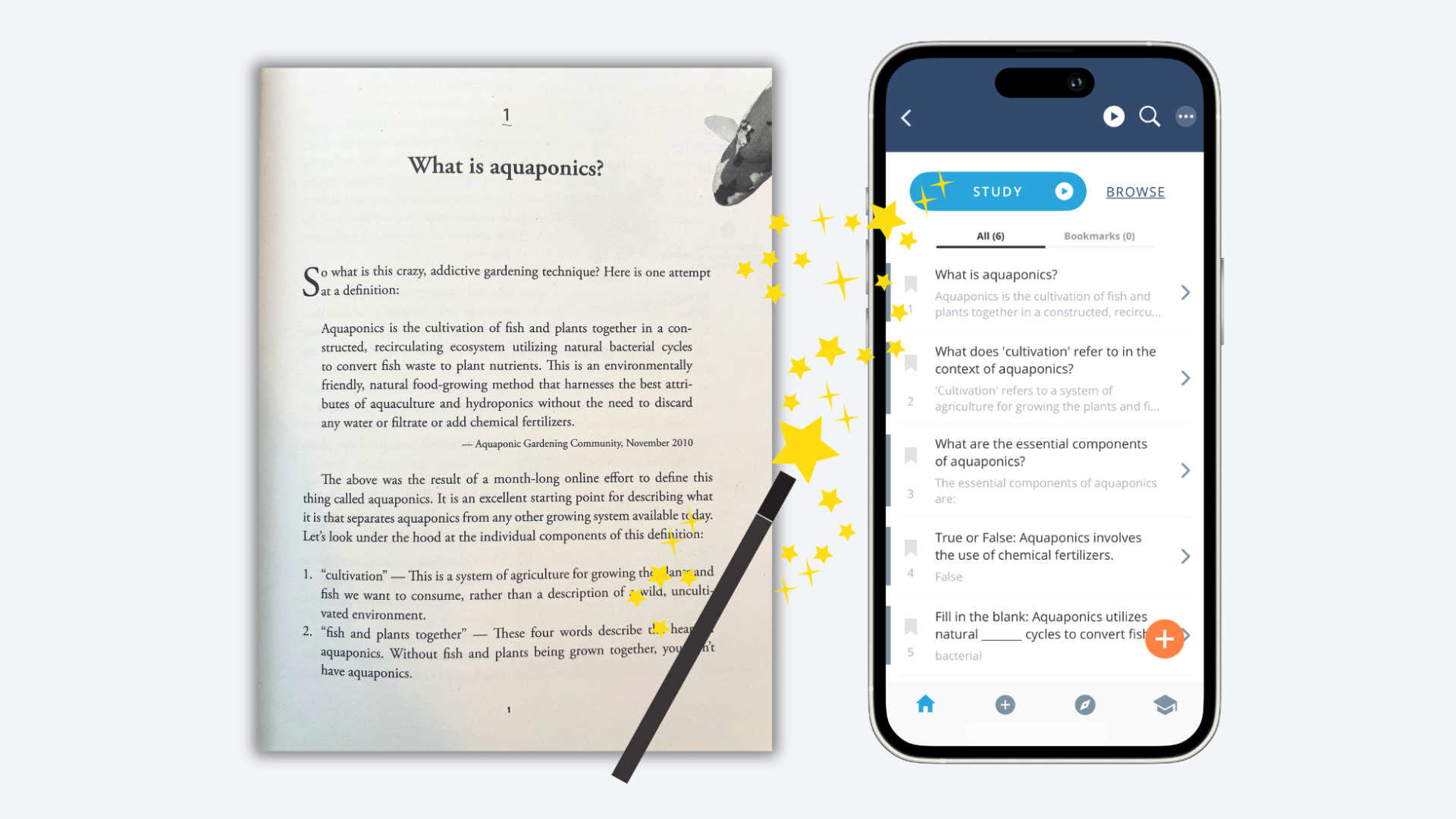
A quick read-through satisfied me that these flashcards were accurate and sufficiently detailed, although I could very well have improved them further by adding images, audio, detailed footnotes, and formatting like bolding or italicizing key words or phrases.
Teachers can do the same thing and with just about any source material.
Think:
- A Word document containing your curriculum
- A photo taken with your mobile of a textbook page or chapter
- A PowerPoint slide deck presentation
- A set of lecture or study notes written on good old fashioned paper
- A spreadsheet of exam/test questions and answers
- Or even transcript from a podcast or YouTube video
Whatever the source of information, you can feed it into the AI and it will identify all of the concepts, reframe them as question-and-answer pairs, and spit out a full set of editable flashcards, which you can then curate to perfectly align with your content.
(Check out the following tutorials on how to convert the different file types to AI flashcards.)
Why This Is a Game-Changer for New Teachers
Why are AI-powered flashcards such a game-changer for teachers?
For starters, you’re using the AI as your TA and it’s saving you a substantial amount of time.
Furthermore, using digital flashcards gets the "drill and practice" part OUT of the classroom and into technology (where it's done best), so you can focus valuable class time on collaborative activities and coaching students to think critically.
Then, aside from eliminating the work of creating flashcards, using an AI flashcard generator empowers you to:
- Differentiate instruction by making separate flashcard collections for ELL learners, IEP goals, or advanced groups, etc.
- Organize flashcards by grade, unit, or even student to stay on top of it all.
- Create warm-up decks to prime students for the next day’s lesson and lesson summaries that outline the key takeaways they need to remember.
- Start building a long-term resource library you can draw from for years.
All of this allows educators to devote much more of their time, energy, and creativity to class time and their students: because you’re delegating the time-consuming work of lesson prep to AI… and the task of retaining the knowledge to your students.
And as if all of that weren’t awesome enough, you’re also making use of a study tool that is proven to facilitate fast, efficient learning. Remember, adaptive flashcard tools also apply the cognitive science of spaced repetition, active recall, and metacognition, which will both help students better learn your curriculum AND help them become better learners for life.
In other words, you’re teaching your students how to learn. And that’s the greatest gift of all.
AI Is a Teaching Tool—For Students, Too
Your students can use AI flashcard generators, too!
That textbook chapter you just assigned as reading? Ask students to create flashcards for it. Then have them collaboratively refine those flashcards together in small groups. Let them quiz each other. Let them teach each other.
Now you’re not only reviewing content, but you’re also teaching students how to evaluate AI output, collaborate, and build their own understanding. That’s digital literacy and critical thinking in action.
And honestly? That’s the kind of future-ready skill set they’ll need more than memorizing the Pythagorean Theorem.
Bonus: All that work they put into creating flashcards throughout the semester/year leaves them with a powerful, ready-made study asset they can use to prep for any test or exam that swings their way, saving them from having to make study notes from scratch.
Bye bye cramming and crummy test scores!
A Smarter Future for Teaching (and Learning)
AI-powered flashcards are so much more than just a teacher hack to save time. They’re a teaching philosophy in action: one that values your time, respects your expertise, and empowers your students to become active participants in their own learning.
For educators, AI-powered flashcards drastically cut down prep time, allowing you to spend more energy where it counts: guiding, coaching, and connecting with students. For learners, these tools turn passive review into an active, personalized study experience grounded in real cognitive science. (Especially flashcard apps that incorporate spaced repetition, like Brainscape.)
You're not just helping students remember more, you’re helping them learn how to learn and leverage AI as a powerful assistant: two skills they’ll carry far beyond your classroom.
Shop Brainscape Flashcards
By Andrew Cohen, Founder and CEO of Brainscape
Guest Post | Follow on LinkedIn
More Posts

Initial Findings: How Test Prep Supports Teacher Diversity

By Praxis Editorial Team
Published on November 12, 2024

ProEthica: Promoting Ethical Education and Teaching Excellence

By Praxis Editorial Team
Published on October 8, 2024

Fostering Teaching Excellence: A Cornerstone of Educational Success

By Praxis Editorial Team
Published on September 24, 2024

Unlocking Student Potential: How SEL Fosters Success

By Praxis Editorial Team
Published on August 27, 2024

Strategies for Student Engagement and Classroom Practice

By Praxis Editorial Team
Published on August 13, 2024
.jpg)
Top AI Tools That Benefit Teaching and Learning

By Praxis Editorial Team
Published on July 30, 2024

Mastering Teacher Skills Through Performance Tasks

By Praxis Editorial Team
Published on July 16, 2024

Embracing Technology as a Learning Partner

By Praxis Editorial Team
Published on July 2, 2024

Becoming a Teacher: A Guide for Aspiring Educators

By Praxis Editorial Team
Published on June 18, 2024

Supercharging Pedagogy: The Power of AI in Education

By Praxis Editorial Team
Published on June 5, 2024

A Critical Resource: The Importance of Literacy Skills

By Praxis Editorial Team
Published on May 21, 2024

Social Emotional Learning: Vital for Teacher Preparation

By Praxis Editorial Team
Published on May 14, 2024

Overcoming Praxis Test Challenges: Retaking and Succeeding

By Praxis Editorial Team
Published on May 7, 2024
.jpg)
Future Directions: How Praxis and Study.com Consider Educator Preparation and Support

By Praxis Editorial Team
Published on April 30, 2024
.jpg)
Unveiling Educational Impact: ETS Praxis Ventures into New Research Horizons

By Praxis Editorial Team
Published on April 23, 2024
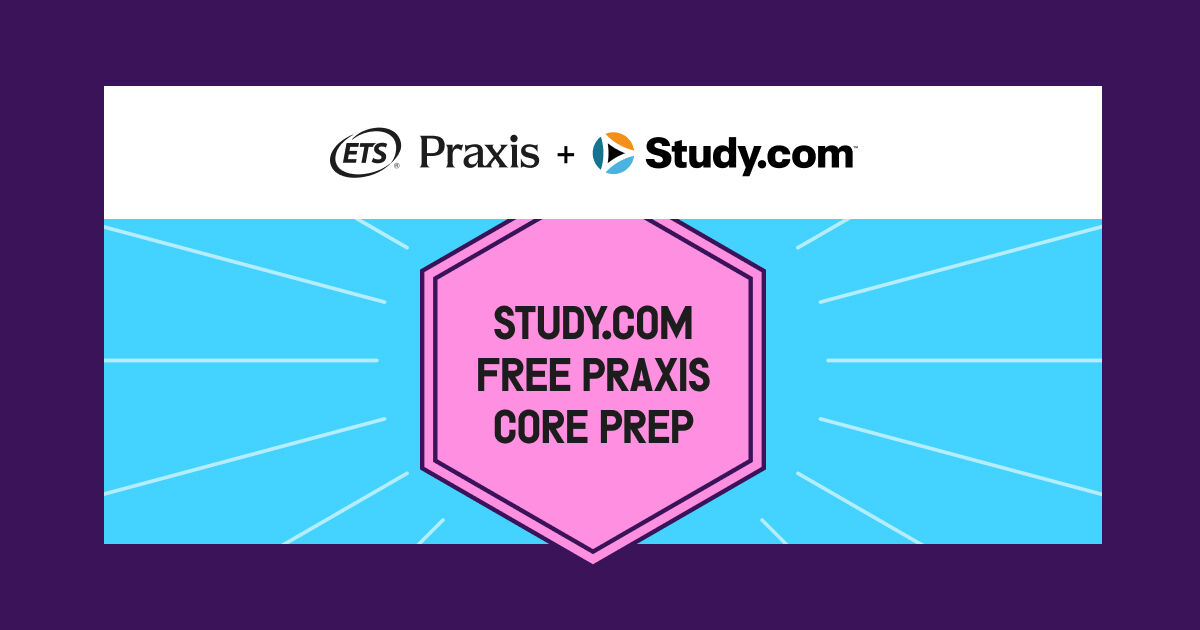
Achieving Success: Our Innovative Test Prep for Praxis Core

By Praxis Editorial Team
Published on April 15, 2024
.jpg)
Unlocking Diversity: ETS and Study.com Research Explores Keys to the Classroom

By Praxis Editorial Team
Published on April 9, 2024

Enhancing Literacy Learning: Blending Technology and Education

By Praxis Editorial Team
Published on April 2, 2024

Get Your Dream Job: Top 10 Interview Questions

By Praxis Editorial Team
Published on March 25, 2024

Making the Grade: Finding Your Ideal First Teaching Job

By Praxis Editorial Team
Published on February 27, 2024

Assessment Strategies I Wish I Knew When I Started Teaching

By Praxis Editorial Team
Published on March 12, 2024

Empowering New Teachers with Professional Development

By Praxis Editorial Team
Published on March 5, 2024

Supercharging Education with Formative Learning

By Praxis Editorial Team
Published on March 19, 2024
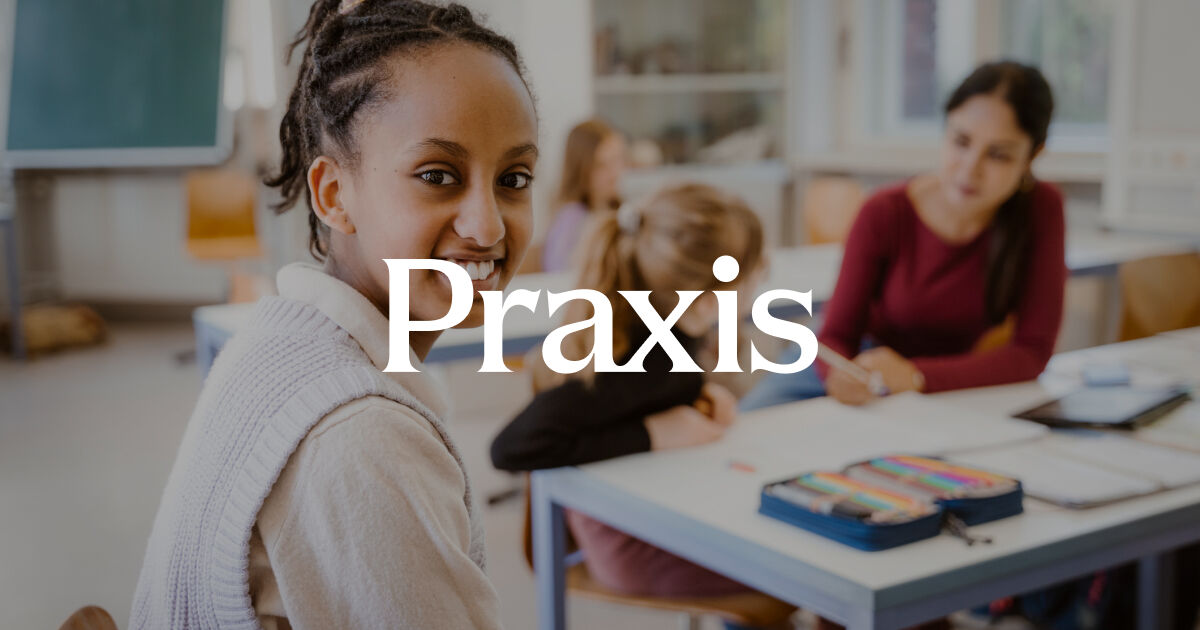
Meet Praxis: Where Education Leads the Conversation

By Praxis Editorial Team
Published on February 20, 2024

Breaking Boundaries: Praxis and Study.com Partner to Empower Educators

By Praxis Editorial Team
Published on February 20, 2024
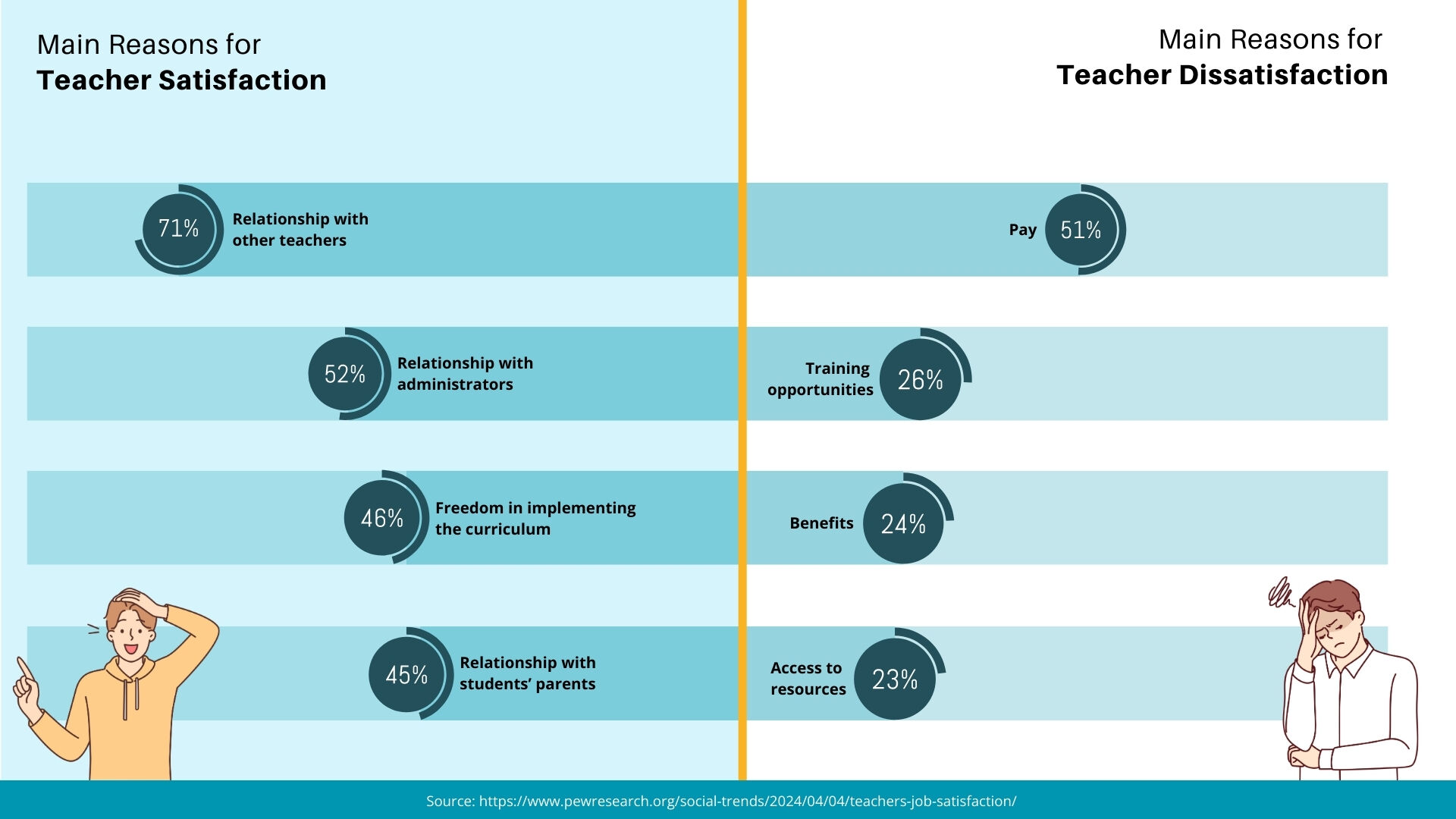
Building the Future of Teaching: Essential Investments for New Educators

By The Study.com Editorial Team
Published on September 10, 2024
